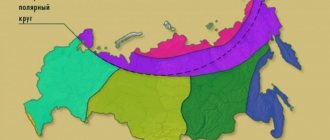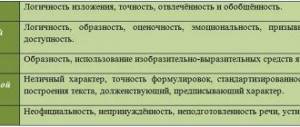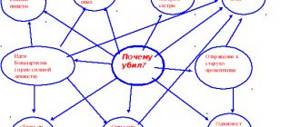Electric power industry of Russia
4) Quantity and place in electricity production.
Where does Russia rank in electricity production? (students answer using a presentation)
Conclusion: Russia is in 4th place in electricity production, after China, the USA and India.
2. Composition of the electric power industry.
a) Traditional electric power industry
.
Teacher:
At each stage of the development of society, people used different sources of energy, ranging from windmills to unconventional types. Today, the main sources of electricity are...power plants. Open the map in the atlas “Electric Power Industry of Russia” on page 12, determine what they are, how they are designated (students answer questions)
Let's look at them in more detail, and enter all the important information into the table “Characteristics of the main types of power plants”, which is available in your reference note.
Using the presentation, we will write down the share of each type of ES in Russia’s electricity generation. (68%, 16%, 16%).
The teacher shows the table in the presentation with one completed question.
And you will fill out the rest of the questions in the table with the help of textbooks and atlases yourself in groups (3-4 students each) (the teacher puts circles with group numbers), each group has its own task:
Group 1 – Features of ES placement
Group 2 – Advantages of ES
Group 3 – Disadvantages of ES
Group 4 – Names of large ES
In 4-5 minutes we will check that the table is filled out correctly.
Checking the correctness of filling out the table: one student from each group reports, and the rest of the group members compare their notes with the presentation.
b) Alternative power engineering.
Teacher:
But in addition to the main types of power plants that we have now considered, there are also power plants operating on alternative energy sources.
Try to name these power plants... Students
: Tidal, geothermal, wind, solar (diagram on presentation).
At the last lesson, I gave the students (Sofia Pozdnyakova and Daniil Mordasov or Maria Mikhailichenko and Veronika Matveicheva) the task to make a report on the topic “Alternative energy sources in Russia”; in addition to the report, they also created a presentation. Let's listen and see how they dealt with it.
3. Energy system.
Teacher
: Probably more than once you have encountered a situation when the lights in your house suddenly turn off. Why is this happening? (students offer their answers... accidents, hurricane, planned outage)
Of course, power supply to consumers must be provided with a high degree of reliability. But electricity consumption is not the same at different times of the day, so “peak” loads may occur in different parts of Russia. However, the vast territory of Russia makes it possible to use the time difference to transfer energy. This is precisely why a unified energy system was created in Russia .
What is electricity?
Since the industry of the developed countries of the world at the end of the 19th - beginning of the 20th centuries. has entered the period of electrification, the electric power industry forms the foundation of the entire economy. It is electricity that powers most machines and mechanisms in enterprises and at home, provides communications (telephone, telegraph, e-mail, etc.), lighting and much more, without which modern society cannot exist. Electricity is a universal, efficient and environmentally friendly form of energy. Russia ranks 4th in the world in its production (Fig. 85).
Even a small power failure can cause serious consequences. For reliable operation of the entire power system, problems at one of the stations must be compensated by other stations. Therefore, power plants are connected by power lines into the Unified Energy System (UES) of Russia.
| Electric power industry - the production of electricity and its transmission to consumers. |
| Power system - groups of power plants of different types, united by high-voltage power lines (PTL) and controlled from one center. |
| ELECTRIC POWER IS THE FOUNDATION OF THE ENTIRE ECONOMY OF THE COUNTRY AND THE BASIS OF THE EXISTENCE OF MODERN SOCIETY. |





